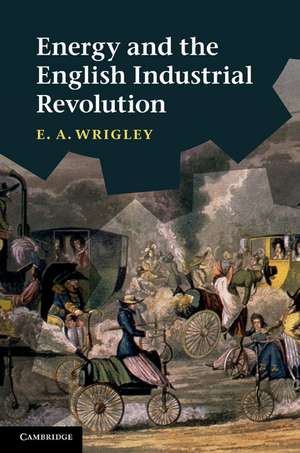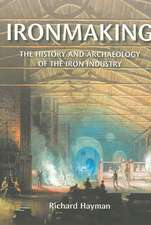Energy and the English Industrial Revolution
Autor E. A. Wrigleyen Limba Engleză Hardback – 18 aug 2010
| Toate formatele și edițiile | Preț | Express |
|---|---|---|
| Paperback (1) | 186.78 lei 3-5 săpt. | |
| Cambridge University Press – 18 aug 2010 | 186.78 lei 3-5 săpt. | |
| Hardback (1) | 436.80 lei 6-8 săpt. | |
| Cambridge University Press – 18 aug 2010 | 436.80 lei 6-8 săpt. |
Preț: 436.80 lei
Nou
Puncte Express: 655
Preț estimativ în valută:
83.63€ • 87.09$ • 69.39£
83.63€ • 87.09$ • 69.39£
Carte tipărită la comandă
Livrare economică 14-28 februarie
Preluare comenzi: 021 569.72.76
Specificații
ISBN-13: 9780521766937
ISBN-10: 0521766931
Pagini: 288
Ilustrații: 10 b/w illus. 1 map
Dimensiuni: 17 x 229 x 152 mm
Greutate: 0.59 kg
Editura: Cambridge University Press
Colecția Cambridge University Press
Locul publicării:Cambridge, United Kingdom
ISBN-10: 0521766931
Pagini: 288
Ilustrații: 10 b/w illus. 1 map
Dimensiuni: 17 x 229 x 152 mm
Greutate: 0.59 kg
Editura: Cambridge University Press
Colecția Cambridge University Press
Locul publicării:Cambridge, United Kingdom
Cuprins
List of figures; List of tables; Acknowledgements; Introduction; Part I. A Sketch of the Argument: 1. The limits to growth in organic economies; 2. The transition from an organic to an energy-rich economy; Part II. Favourable Developments: 3. Agricultural change and urbanisation; 4. Energy and transport; 5. Occupational structure, aggregate income, and migration; 6. Production and reproduction; Part III. What Set England Apart from her Neighbours: 7. The timing and nature of change in the industrial revolution; 8. Modernisation and the industrial revolution; Part IV. Retrospective: 9. The industrial revolution and energy; Appendix 1. Fuller versions of three tables printed in the main text; Bibliography; Index.
Recenzii
'This book has changed the way I see the world. Smart, engaging and beautifully written, Wrigley's study of the Industrial Revolution casts a fascinating light on current energy questions. If you want to understand how our dependency on fossil fuels began and what we might do to escape it, you must read this book.' George Monbiot
'Here, Tony Wrigley develops the central themes that have characterized his distinctive contribution to the economic transformation of England. There is no better account of the role that the energy revolution played in the escape from the constraints of the Malthusian pre-industrial economy.' Nicholas Crafts, University of Warwick
'Tony Wrigley is one of the true Grand Men of the economic history profession. In this book he analyzes in depth the role of energy supplies in the emergence of modern economic growth and thus strikes a fascinating and most timely link between economic history and contemporary issues of energy and environment. Energy economics are of central importance to any study of economic change, especially when supported by the breadth of the learning underlying this book.' Joel Mokyr, Northwestern University
'Whether wind or solar power can ever provide the energy needed in an increasingly energy-conscious and insecure world is debatable but this excellent book provides a historical perspective that is either ignored or given little credence in contemporary debates of considerable subtlety and relevance. This is a book not to be ignored.' The Historical Association (history.org.uk)
'… an accessible and comprehensive guide to his interpretation of the industrial revolution. It offers at once a clear and compelling argument for the centrality of energy in the historical rise of industrial societies and an opportunity to meditate on the future sustainability of an economic order founded on fossil fuels.' Jan de Vries, Economic History Review
'… an often brilliant and always perceptive presentation of some of the key conclusions from every decade of his half-century of academic research to date.' Michael Anderson, Population Studies
'Here, Tony Wrigley develops the central themes that have characterized his distinctive contribution to the economic transformation of England. There is no better account of the role that the energy revolution played in the escape from the constraints of the Malthusian pre-industrial economy.' Nicholas Crafts, University of Warwick
'Tony Wrigley is one of the true Grand Men of the economic history profession. In this book he analyzes in depth the role of energy supplies in the emergence of modern economic growth and thus strikes a fascinating and most timely link between economic history and contemporary issues of energy and environment. Energy economics are of central importance to any study of economic change, especially when supported by the breadth of the learning underlying this book.' Joel Mokyr, Northwestern University
'Whether wind or solar power can ever provide the energy needed in an increasingly energy-conscious and insecure world is debatable but this excellent book provides a historical perspective that is either ignored or given little credence in contemporary debates of considerable subtlety and relevance. This is a book not to be ignored.' The Historical Association (history.org.uk)
'… an accessible and comprehensive guide to his interpretation of the industrial revolution. It offers at once a clear and compelling argument for the centrality of energy in the historical rise of industrial societies and an opportunity to meditate on the future sustainability of an economic order founded on fossil fuels.' Jan de Vries, Economic History Review
'… an often brilliant and always perceptive presentation of some of the key conclusions from every decade of his half-century of academic research to date.' Michael Anderson, Population Studies
Notă biografică
Descriere
This book explains how new sources of energy increased productivity, thereby transforming industry and changing England permanently and fundamentally.






